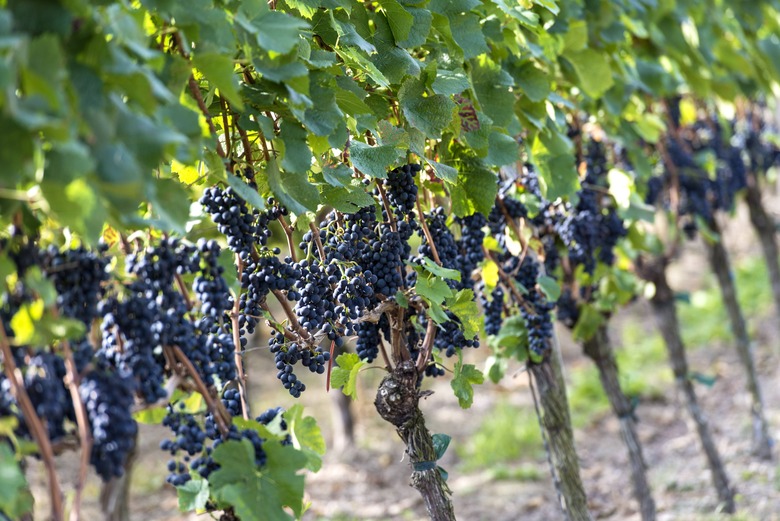Serious Single-Vineyard Wines From A Sonoma County Veteran
If you had asked me what I thought, until recently, about the character of Davis Bynum wines, I would have said "transparent" — meaning they were invisible in the crowded wine marketplace. So when the Davis Bynum people told me that property's long-time winemaker, Greg Morthole, was coming through town, I leapt at the invitation to meet him and taste his current portfolio over dinner.
Winemakers coming out of the fermented air of their cellars to criss-cross the country is a signal: it means that they have good news to deliver. On this occasion, I was not to be disappointed. Davis Bynum Winery is tightly focused on all the quality markers of California wine: single-vineyard designations, grape selection based on terroir, attention to clonal composition, constrained scale of operations, an in-house winemaking team, and an aspirational attitude. The results show in the wines, which are now cusping 90 points across several publications and routinely winning medals in competitions. My own tasting showed wines of enormous likeability for quaffing and immediate approachability. All pair copacetically with the kind of New American cuisine we can thank California for.
Davis Bynum himself came to wine as a second career, like so many California wine pioneers. In his case he was a journalist writing for the San Francisco Chronicle. In 1973, after experiments with winemaking at home and in a former plumbing warehouse in Albany, California, he purchased 84 acres alongside the Russian River about eight miles southwest of Healdsburg and established Davis Bynum Winery. He was the first to identify a Russian River Valley pinot noir with a single-vineyard designation — a practice that nowadays is the near-universal goal of all top wineries. He paid Joe Rochioli twice the $150 a ton he was then getting for his grapes (which went into bulk wine) in order to create Rochioli Vineyard pinot noir.
Bynum made wine, "intuitively," he says, until 2007, when he retired, selling the business to Tom Klein, owner of Rodney Strong Vineyards. He remains a fixture in the winery operations, playing an ambassadorial role.
The thread of continuity from the Bynum to Klein is Greg Morthole. He joined the winery as lab director in 2005, becoming assistant winemaker in 2007 and winemaker in 2010. Born in Sacramento, Morthole earned a B.S. in natural sciences and mathematics and held lab positions with Vinquiry (a wine analysis company) and Chalk Hill Winery before joining Bynum.
All of the wines that Morthole makes today come from two estate vineyards: River West Vineyard, planted only to chardonnay, in demarcated clonal blocks, and Jane's Vineyard, planted to demarcated blocks of pinot noir with one anomalous five-acre block of sauvignon blanc. (He oversaw the addition of wine from this block to the Bynum portfolio beginning with the 2012 vintage.)
Here are my tasting notes:
Virginia's Block Sauvignon Vineyard (Jane's Vineyard) 2014 ($25). A fresh and fruity wine notable for its ripeness (tropical fruits as well as citrus are evident in the nose) and for showing far less grassiness than is common in sauvignon.
River West Vineyard Chardonnay 2013 ($25). This wine was made following the classic California script of malolactic fermentation and batonnage, then barrel-aging in French oak (30 percent new in this case). The result is a rich, vibrant, fruity example of chardonnay, enlivened by rigid phenolic backbone. It would be ideal with lobster (and is good value).
On to the pinot noirs, the wines by which the winery's reputation will stand or fall.
Jane's Vineyard Pinot Noir 2013 ($35). A blend from multiple blocks and 10 different clones. The fruit is ripe and open, redolent with red fruit and vanilla flavors. The 2014 vintage of the same wine has a similar cast on the palate, but more structure and obvious youth. Nonetheless, both are ready to drink. I had duck, ham, and pork tenderloin on my mind as I sipped it, and it worked well with the gnocchi that I had on my plate.
Jane's Vineyard Pinot Noir, Dijon Clone 115, 2013 ($55). This is one of two single-clone wines in the Bynum portfolio (the other, Dijon 777, was not served). I have not seen any reviews yet, but expect its intensity and complexity of fruit in the mouthfeel to be rewarded with 90-plus scores.
Overall, an impressive selection and a clearly focused producer. Transparent is no longer an adjective that I shall apply to Davis Bynum wines.
